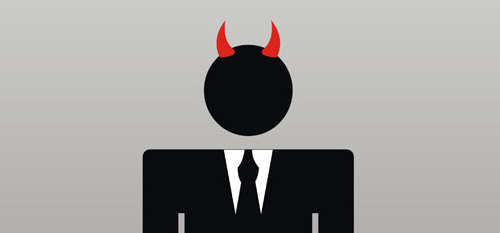This is sort of a follow up to a couple of other posts I wrote about picking your clients and doing pro bono work. In those posts, I talked about how to avoid bad clients and how to avoid getting stepped on in general. Even if you try to avoid those clients, some will slip through the cracks. In this post, I want to talk about how to handle those “bad clients”.

There are so many different opinions out there on how to handle bad clients. I’ve read books that talk about firing clients and I’ve talked to people who just say to pacify them because they still bring in revenue – the customer is always right mentality. It’s really only customers who think the customer is always right. If you’ve been in business any time at all, you know that the customer is NOT always right. But, that’s by no means an invitation to act hostile towards the client. Dealing with bad clients takes finesse and a little bit of confidence. Even if they are a bad client, they may have friends who are not and the last thing you want to do is have this bad client go around giving you a bad reputation.
Let’s start with a personal example, I have an IT client that is a extremely difficult client. They constantly are late on payments, difficult to work with, and expect the world for nothing. In a recent situation, I sent one of my newer techs over to their offices where he spent about four hours working on a laundry list of issues. Was it mean of me to send him over there unsupervised and into hostile territory? Maybe a little…. but it’s a very good experience for him. How to properly handle these clients may benefit him in the future.
The work was completed after an exhausting few hours for my tech and then the next day I get a call from the bad client. He informs me that my tech was basically useless, disputing the hours spent and just generally bad-mouthing. He stated that he will not pay for the service. My favorite quote from the fellow was that he had to assist him in fixing issues on several occasions (read that as handing him a piece of paper) and then attacking his knowledge of the subject.
Now, here’s the tricky part. You never should go into defensive mode here. Going on the defensive will jut make the situation worse. If the client is attacking, you should stay claim and hear them out – let them vent their concerns. I realize this is harder to do than to say but you get better at it over time. You have two options at this point, you can either address their concerns verbally or you can simply state that you’ll look into the issue and get back to them – always choose to get back to them.
Addressing the concerns verbally will give the customer immediate response and possibly a quicker resolution but that’s not what you’re after here. You will likely make a rash decision which almost always does not turn out in your favor. The best course of action is to simply state, you’ll look into it and get back with them. Then, once you’ve collected your thoughts on the matter you can email them.
With the regards to my client, I did exactly that. I touched base with my tech to find out the details of the situation and together we addressed the concerns of the client. I documented everything that the client expressed concern over and then put together an email regarding how we will “address” and resolve the issues and concerns. In the end, the client was happy with the outcome.
Now, one bad instance does not make a bad client, multiple instances does. If a client becomes a drain on your company, then you must rid yourself of that client. Never burn a bridge however; I have seen clients leave for greener pastures and then come back with a more humble attitude. Always give them a bridge – I have passed off difficult clients to other developers; not because I dislike the clients or the other developers but because what’s a good fit for me may not be a good fit for someone else and vice versa.
Long story short, if a client becomes a support drain, look for alternatives. Your clients are the most important thing to your business both good and bad.
Man, That was dead on the money. I work the same general region as you do and I have been struggling with this very thing recently. Firing a couple of clients was a hard thing to do, but boy do I feel better.
Thanks for sharing your knowledge.